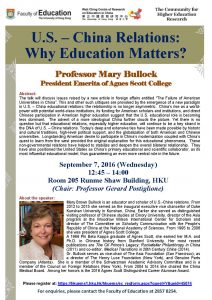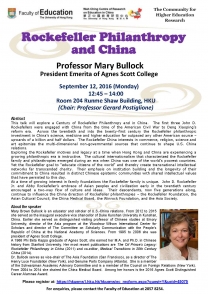
Seminar: U.S. – China Relations: Why Education Matters?
Date: September 7, 2017
Time: 12:45-14:00
Venue: Room 205, Runme Shaw Building, HKU
Speaker: Professor Mary Bullock, President Emerita of Agnes Scott College
Chair: Professor Gerard A. Postiglione
Abstract: The talk will discuss issues raised by a new article in foreign affairs entitled “The Failure of American Universities in China”. This and other such critiques are provoked by the emergence of a new paradigm in U.S. – China educational relations: the relationship is no longer asymmetric. China’s rise as a worldpower with potential world-class institutions, its funding for American scholars and institutions, and direct Chinese participation in American higher education suggest that the U.S. educational role is becoming less dominant. The advent of a more ideological China further clouds the picture. Yet there is no question but that educational relations, especially higher education, will continue to be a key strand in the DNA of U.S. – China relations. Today’s deep and extensive ties have been made possible by historic and cultural traditions, high-level political support, and the globalization of both American and Chinese universities. Longstanding American desire to participate in China’s modernization coupled with China’s quest to learn from the west provided the original explanation for this educational phenomena. These non-governmental relations have helped to stabilize and deepen the overall bilateral relationship. They have also positioned the United States as China’s primary educational and scientific collaborator, as its most influential educational model, thus guaranteeing an even more central role in the future.

Seminar: Rockefeller Philanthropy and China
Date: September 12, 2017
Time: 12:45-14:00
Venue: Room 204, Runme Shaw Building, HKU
Speaker: Professor Mary Bullock, President Emerita of Agnes Scott College
Chair: Professor Gerard A. Postiglione
Abstract: This talk will explore a Century of Rockefeller Philanthropy and in China. The first three John D. Rockefellers were engaged with China from the time of the American Civil War to Deng Xiaoping’s reform era. Across the twentieth and into the twenty-first century the Rockefeller philanthropic investment in China’s science, medicine and higher education far outpaced any other American source – upwards of a billion and half dollars. The Rockefeller China interests in commerce, religion, science and art epitomize the multi-dimensional non-governmental sources that continue to shape U.S. China relations. Exploring the Rockefeller motives and legacy at a time when Hong Kong and China are experiencing a growing philanthropic era is instructive. The cultural internationalism that characterized the Rockefeller family and philanthropies emerged during an era when China was one of the world’s poorest countries. Yet the Rockefeller goal to “educate citizens of the world” and thereby create transnational intellectual networks far transcended charity. Their emphasis on institution building and the longevity of their commitment to China resulted in distinct Chinese epistemic communities with shared intellectual values that have persisted to this day. At a time of growing interest in family foundations the Rockefeller family is unique. John D. Rockefeller Jr. and Abby Rockefeller’s embrace of Asian peoples and civilization early in the twentieth century encouraged a two-way flow of culture and ideas. Their descendants, now five generations along, continue to influence the China direction of Rockefeller philanthropies – the Rockefeller Foundation, the Asian Cultural Council, the China Medical Board, the Winrock Foundation, and the Asia Society.
